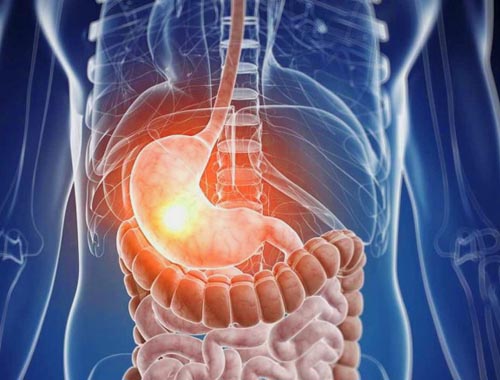Gastroenteritis (Enteritis, Colitis)

Published: 18 Jun 2025
ICD9: 558.9 ICD10: K52.9 ICD11: 1A40.Z
Gastroenteritis, also commonly known as a stomach bug, is an inflammation of the stomach and intestines that causes diarrhea, vomiting, and stomach pain.
It's often referred to by its individual components as well:
![]() Enteritis: Inflammation of the small intestine
Enteritis: Inflammation of the small intestine
![]() Colitis: Inflammation of the colon (large intestine)
Colitis: Inflammation of the colon (large intestine)
![]() Gastroenteritis: Inflammation of both the stomach and the intestines
Gastroenteritis: Inflammation of both the stomach and the intestines
Causes:
![]() Viral infections: These are the most common cause, especially norovirus and rotavirus.
Viral infections: These are the most common cause, especially norovirus and rotavirus.
![]() Bacterial infections: Bacteria like Salmonella, E. coli, Campylobacter, and Shigella can cause gastroenteritis.
Bacterial infections: Bacteria like Salmonella, E. coli, Campylobacter, and Shigella can cause gastroenteritis.
![]() Parasites: Parasites like Giardia can cause gastroenteritis, particularly through contaminated water.
Parasites: Parasites like Giardia can cause gastroenteritis, particularly through contaminated water.
![]() Food poisoning: Toxins produced by bacteria in contaminated food can cause gastroenteritis-like symptoms.
Food poisoning: Toxins produced by bacteria in contaminated food can cause gastroenteritis-like symptoms.
![]() Medications: Some medications can irritate the stomach and intestines.
Medications: Some medications can irritate the stomach and intestines.
![]() Chemicals: Exposure to certain chemicals can also cause gastroenteritis.
Chemicals: Exposure to certain chemicals can also cause gastroenteritis.
Symptoms:
![]() Diarrhea (often watery)
Diarrhea (often watery)
![]() Vomiting
Vomiting
![]() Abdominal cramps and pain
Abdominal cramps and pain
![]() Nausea
Nausea
![]() Fever
Fever
![]() Loss of appetite
Loss of appetite
![]() Headache
Headache
![]() Muscle aches
Muscle aches
![]() Dehydration (especially in young children, the elderly, and people with weakened immune systems)
Dehydration (especially in young children, the elderly, and people with weakened immune systems)
Transmission:
Gastroenteritis is highly contagious and can spread through:
![]() Contact with infected people: Touching contaminated surfaces and then touching your mouth, nose, or eyes.
Contact with infected people: Touching contaminated surfaces and then touching your mouth, nose, or eyes.
![]() Contaminated food or water: Eating or drinking food or water that is contaminated with bacteria, viruses, or parasites.
Contaminated food or water: Eating or drinking food or water that is contaminated with bacteria, viruses, or parasites.
![]() Poor hygiene: Not washing hands thoroughly after using the toilet or before preparing food.
Poor hygiene: Not washing hands thoroughly after using the toilet or before preparing food.
Treatment:
Most cases of gastroenteritis are mild and resolve on their own within a few days. The main focus of treatment is to prevent dehydration:
![]() Drink plenty of fluids: Water, clear broths, electrolyte solutions (like Pedialyte), and diluted juices.
Drink plenty of fluids: Water, clear broths, electrolyte solutions (like Pedialyte), and diluted juices.
![]() Eat bland foods: Start with small amounts of easily digestible foods like crackers, toast, bananas, and rice.
Eat bland foods: Start with small amounts of easily digestible foods like crackers, toast, bananas, and rice.
![]() Rest: Allow your body to recover.
Rest: Allow your body to recover.
![]() Avoid dairy products, caffeine, alcohol, and fatty foods: These can worsen symptoms.
Avoid dairy products, caffeine, alcohol, and fatty foods: These can worsen symptoms.
![]() Over-the-counter medications: Anti-diarrheal medications (like loperamide) and anti-emetics (anti-vomiting medications) may be used in some cases, but it's important to talk to your doctor or pharmacist before using them, especially for children.
Over-the-counter medications: Anti-diarrheal medications (like loperamide) and anti-emetics (anti-vomiting medications) may be used in some cases, but it's important to talk to your doctor or pharmacist before using them, especially for children.
When to See a Doctor:
You should seek medical attention if you experience any of the following:
![]() Severe dehydration (signs include decreased urination, dizziness, extreme thirst, rapid heartbeat)
Severe dehydration (signs include decreased urination, dizziness, extreme thirst, rapid heartbeat)
![]() Bloody stool or vomit
Bloody stool or vomit
![]() High fever (over 101°F or 38.3°C)
High fever (over 101°F or 38.3°C)
![]() Severe abdominal pain
Severe abdominal pain
![]() Inability to keep down fluids
Inability to keep down fluids
![]() Symptoms lasting more than a few days
Symptoms lasting more than a few days
![]() Underlying health conditions (diabetes, kidney disease, etc.)
Underlying health conditions (diabetes, kidney disease, etc.)
Prevention:
![]() Wash your hands frequently: Especially after using the toilet, before eating, and after being in contact with someone who is sick.
Wash your hands frequently: Especially after using the toilet, before eating, and after being in contact with someone who is sick.
![]() Practice safe food handling: Cook food thoroughly, store food properly, and avoid cross-contamination.
Practice safe food handling: Cook food thoroughly, store food properly, and avoid cross-contamination.
![]() Drink safe water: If you are unsure about the safety of the water, boil it or use bottled water.
Drink safe water: If you are unsure about the safety of the water, boil it or use bottled water.
![]() Get vaccinated: The rotavirus vaccine is available for infants and can help prevent rotavirus gastroenteritis.
Get vaccinated: The rotavirus vaccine is available for infants and can help prevent rotavirus gastroenteritis.
In summary, gastroenteritis is an inflammation of the stomach and intestines, leading to a variety of unpleasant symptoms. While usually self-limiting, it's important to stay hydrated and seek medical attention if symptoms are severe or persistent.